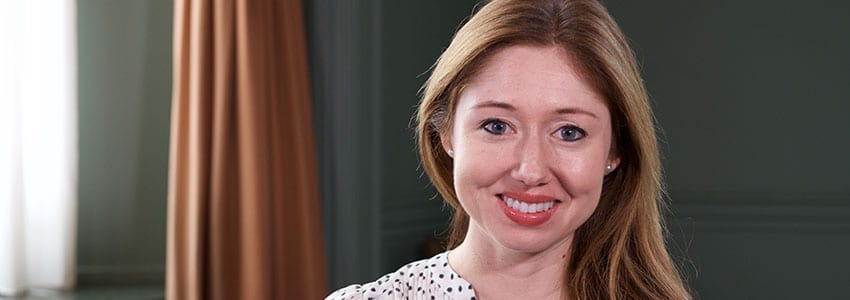It is prestigious to be a part of one of the best graduate programs in your field, and there’s a lot of privilege that comes with the ability to attend a university like ours. Becky Christensen has a more holistic view on the privilege we have, and during her time at U-M, she’s explored and shaped what that means for her, the many students she’s taught, and the body of research she’s creating.
Becky hails from Fremont, California and received a B.A. in Psychology and Social Behavior from the University of California, Irvine. Her initial goal was to be a counseling psychologist, but it was a course in her Psychological Counseling Master’s program at Teachers College, Columbia University that she couldn’t get out of her mind. She says, “The program had a strong focus on multicultural counseling, and as part of that training, I took an intensive course called Racial-Cultural Counseling Laboratory. It was the first time I ever thought about white privilege. It was an eye opener to me. I worked for almost four years as a career counselor at UC Berkeley after that, but in the back of my mind was the experience I had in that class. I started a multicultural initiative to support underrepresented students, and created and taught a Multicultural Career Development course at Cal. All of this led me in the direction of higher education administration.”
She had no connection to U-M and didn’t know that ours was one of the top rated doctoral programs in higher education, but she was drawn to U-M because of the specialty programs, particularly the academic affairs and student development concentration and the focus on access and equity issues.
She says, “What I felt really good about was being offered a Rackham Merit Fellowship which provided 5 years of guaranteed funding. I also got to attend the Summer Institute and spend the summer before starting grad school taking statistics classes which was very helpful since I had taken a long break. There, I got to meet grad students from all over U-M.”
During this journey, her interest started with access and general support for underrepresented minority students and community college transfer students. A pivotal experience working with Intergroup Relations (IGR) over the last three years has significantly shaped her doctoral research. She explains, “I became a CommonGround facilitator and was provided a lot of training on how to deliver social justice education and curriculum to groups and departments all over campus, from student organizations to residence halls, and that led me to become specifically interested in how to get students to think about their own privilege and power and how to create more dialogic experiences. I then got the chance to be a graduate student instructor for an Intergroup Relations course and I loved that experience.”
In her dissertation, Becky is studying a cohort of first-year students from the Michigan Community Scholars Program (MCSP), a U-M residential learning community, to see how their involvement in MCSP shaped their definitions of social justice, and their attitudes and behaviors around engaging in social justice issues and promoting social change. As a result of her leadership in creating a dialogue program for MCSP, and other social justice efforts on campus to promote teaching and learning in the area of social justice education, Becky was one of ten nationwide recipients of the 2015 K. Patricia Cross Future Leaders Award through the Association of American Colleges and Universities. Currently, Becky is a graduate student services assistant (GSSA) for MCSP, which allows her to continue to work on the dialogue program and be immersed in the context of her dissertation.
Issues related to power, privilege, and oppression, and creating an inclusive campus climate are central to her career aspirations. She hopes to promote diversity, equity, and inclusion in higher education as both an educator and administrator upon receiving her doctorate. In order to gain further training as a social justice educator, she’s currently an Engaged Pedagogy Initiative Fellow through the Center for Engaged Academic Learning (CEAL), and is working on developing a syllabus for a service-learning course that would integrate an IGR model with hands-on experience with working with social justice and intergroup relations issues in the local community. She completed the Multicultural Classroom Facilitation Training through CRLT and IGR so that she’ll be able to create more inclusive classrooms in the future. Becky is also active in social justice activities across campus, seen in her participation in the United Coalition for Racial Justice (UCRJ), which involved helping to plan a teach-in session on diversity and inclusion issues at the Speak Out in the Shapiro Undergraduate Library last year.
Outside of academia, Becky keeps her eyes open for any opportunity to participate in meaningful programs across campus. She says, “I never knew there would be so many well-known, famous, or influential people coming here. I go to a lot of talks and lectures when possible. I want to participate in all the campus has to offer. I can reflect on these experiences and use them to help me analyze my dissertation.”Becky is also currently a member of the Student Advisory Board for Dean of Students Laura Blake Jones and served on Vice President Royster E. Harper’s board for the past two years. She also had the chance to eat Thanksgiving dinner with President Mark Schlissel and his wife, Monica Schwebs last Fall.
During her tenure in town, Becky has lived in the Kerrytown or Old West Side neighborhoods of downtown Ann Arbor, affording her lots of opportunities to walk to live music and restaurants with friends. “I grew up in a larger metropolitan area, but Ann Arbor has a lot going on. There are a lot of grad students and young professionals here and that makes a real difference.”

